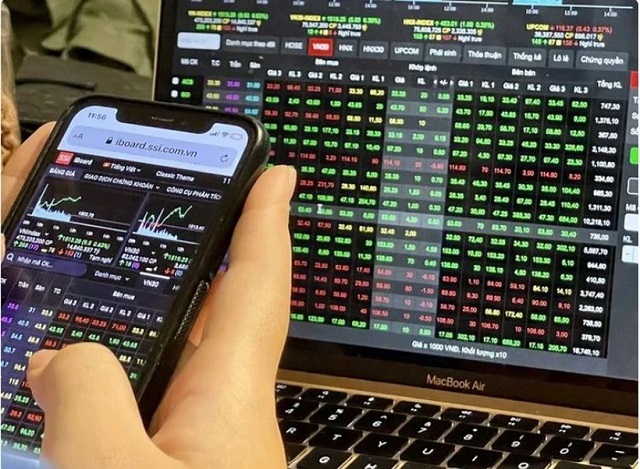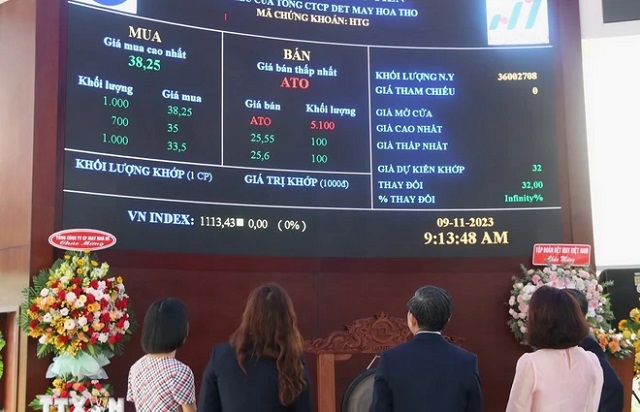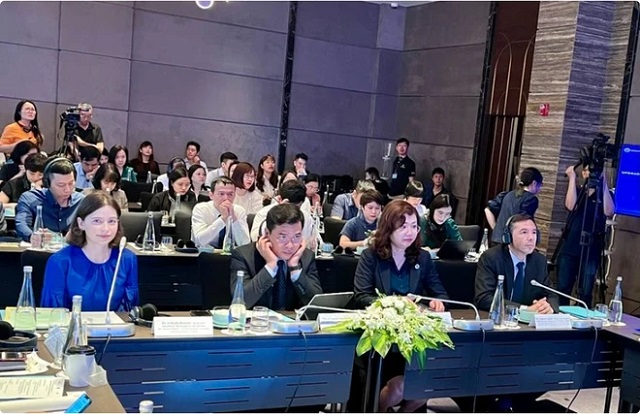
A trading session. (Photo: Vietnam+)
|
The Vietnamese stock market is considered a “big fish in a small pond” as its capitalization and liquidity are far superior to other frontier markets.
This is the assessment from experts at Phu Hung Securities Joint Stock Company (PHS) regarding the progress of the stock market upgrade.
According to PHS, Vietnam’s stock weight is currently leading in the frontier market indices of FTSE and MSCI. Upgrading the market from frontier to emerging is considered the most important “bottleneck” for Vietnam’s stock market to enter a period of sustainable growth, thereby promoting its role as an effective capital mobilization channel for the economy.
The upgrade will help attract more foreign investors to the Vietnamese stock market through ETFs (exchange-traded funds) and mutual funds that are investing in emerging markets.
However, there is a significant difference in the market index fluctuations between the FTSE and MSCI emerging market upgrades. Specifically, with FTSE upgrade assessments, the market indices will generally not fluctuate much during the period from the time of the announcement to when the market officially is upgraded.
For example, in the case of Qatar (9/2015-9/2016) decreased by 8.9% or Kuwait (9/2017-9/2018) decreased by 2.2%. Meanwhile, market indices will often have a quite strong upward surge with MSCI upgrade assessments.
Qatar and the United Arab Emirates increased by 39% and 43%, respectively, within one year from the announcement that they would be upgraded. Kuwait also recorded a rate of return of 35% nearly three years after MSCI announced the upgrade.
A report by the CFA Institute Financial Analyst Journal also indicates that the MSCI index representing upgraded markets will record an average 23.2% increase from the day of announcement to the day it takes effect or when the reclassification takes place.
The scale of the MSCI emerging market is much larger than that of the FTSE emerging market. Therefore, the capital flow from the upgrade by MSCI will also be superior.
The Vietnamese stock market has been added to the FTSE watchlist for upgrading to secondary emerging market since September 2018. Accordingly, Vietnam has met seven of the upgrade criteria. However, there are still two criteria that have not been met: the Settlement Cycle (DvP) and Settlement-Rare Fail Trade Ratio.

|
In addition, in the most recent review in September 2023, the organization also asked Vietnam to further improve the account opening registration process, as well as implement an efficient mechanism to facilitate trading between foreign investors trading securities that have reached or almost reached the foreign ownership limit.
The new KRX trading system is a necessary condition to address the FTSE upgrade criteria. Currently, the State Securities Commission has submitted to the Ministry of Finance proposals to amend and supplement a number of documents, the first of which is not to require a 100% deposit from foreign investors.
The clearing and settlement mechanism for securities transactions (CCP) is expected to be implemented after the KRX system is operational. This is a sufficient condition to meet the Settlement Cycle (DvP) criterion. The CCP mechanism managed by the Vietnam Securities Depository Center (VSDC) will change the pre-purchase deposit rate.
Instead of having to have 100% of the deposit funds before buying, investors only need to deposit according to the requirements of the clearing member (expected from 10-20%). This also has the risk of resulting in failed transactions in some cases, thereby providing the basis for assessing the criterion “Settlement-Rare Fail Trade Ratio.”
However, in the opinion of PHS, the roadmap for upgrading to FTSE’s secondary emerging market may not be as soon as previously expected. Specifically, FTSE will have two assessment periods in a year. The September assessment each year will be the official change time for upgrading or downgrading the markets.
Meanwhile, the March assessment each year — known as the interim assessment — will usually provide comments on the upgrade watchlist that was announced in the September report of the previous year.
In the most favorable case, if the upgrade criteria are met early, FTSE Russell will announce the upgrade in the March assessment period of this year and it will be officially upgraded in September of the same year.
With the current situation, when the KRX system is still in the testing phase, experts believe that the Vietnamese market will find it difficult to fall into this favorable situation. Instead, FTSE may announce the upgrade results for the Vietnamese market in September 2024, and the official upgrade time will be a year later, corresponding to September 2025.
With MSCI, the assessment criteria of this organization are much more stringent than FTSE. At the latest assessment in June 2023, Vietnam did not meet as many as 9 of the upgrade criteria.
In addition to having a clearing and settlement system to address the issue of pre-transaction deposits – Prefunding, MSCI pays special attention to the criteria related to the ownership limit and benefits for foreign investors. MSCI also pointed out two other points that need to be improved: the account opening registration process for foreign investors and the disclosure of corporate information in English so that investors can access and grasp the information promptly.
 Scientific workshop with the theme “Solutions to upgrade the Vietnamese stock market,” April 16. (Photo: Vietnam+)
|
To address these criteria, the Vietnamese stock market will need improvements in the legal aspect. In reality, the Ministry of Finance is currently gathering feedback on the draft Circular amending 4 circulars in support of the stock market upgrade.
This Circular includes Circular No. 96/2020/TT-BTC of the Ministry of Finance: Guidelines for information disclosure on the stock market; Circular 119/2020/TT-BTC Regulations on the activities of registration, deposit, clearing, and settlement of securities transactions; Circular No. 120/2020/TT-BTC regulating the trading of listed shares, registration of trading, and fund certificates, corporate bonds, and secured warrants listed on the securities trading system; Circular 121/2020/TT-BTC regulating the operations of securities companies issued by the Minister of Finance.
The amendment focuses on removing the 100% deposit requirement for foreign investors, along with the disclosure of information in English. In the best-case scenario when the amended circulars are approved soon this year, PHS expects MSCI to consider adding Vietnam to the upgrade watchlist at the June 2025 assessment.
Within 2 years after being added to the watchlist at the earliest, Vietnam will be officially upgraded to MSCI’s emerging market, corresponding to the June 2027 assessment. It is forecasted that there will be approximately 1.41 billion USD from ETFs disbursed into the Vietnamese stock market at the time of the upgrade. Meanwhile, active capital from mutual funds will flow into the market earlier, right at the time of the announcement of the upgrade results. In fact, the “bottlenecks” for upgrading the market are being “thoroughly” implemented by the management agencies.
Recently, Chairwoman of the State Securities Commission Vu Thi Chan Phuong chaired a reception, working session, and information exchange with a team of officials from FTSE and MSCI on the upgrading of the Vietnamese stock market.
Representatives of the State Securities Commission and the working group of FTSE and MSCI had discussions to help the representatives of the rating organizations better understand the content of the Draft Circular amending and supplementing a number of articles in the Circulars regulating securities trading on the securities trading system, clearing, and settlement of securities transactions,





































